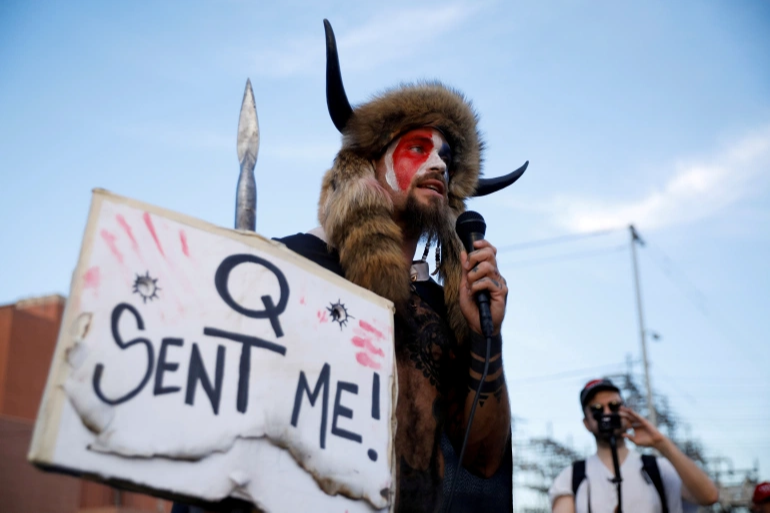
Jacob Chansley, also known as Jake Angeli, holding a sign referencing QAnon, speaks as supporters of Donald Trump protest against early results of the 2020 presidential election, in front of the Maricopa County Tabulation and Election Center, in Phoenix, Arizona, US November 5, 2020 [File: Cheney Orr/Reuters]
Washington, July 10 (RHC)-- On the face of it, the QAnon conspiracy appears to have largely disappeared from big social media sites. But that is not quite the case.
Popular QAnon catchphrases like “great awakening,” “the storm” or “trust the plan” are less prevalent on Facebook these days. Facebook and Twitter have removed tens of thousands of accounts dedicated to the baseless conspiracy theory, which depicts former President Donald Trump as a hero fighting a secret battle against a sect of devil-worshipping paedophiles who dominate Hollywood, big business, the media and government.
Gone are the huge “Stop the Steal” groups that spread falsehoods about the 2020 U.S. presidential elections. Trump is gone as well, banned from Twitter permanently and suspended from posting on Facebook until 2023.
But QAnon is far from winding down. Federal intelligence officials recently warned that its adherents could commit more violence, like the deadly Capitol insurrection on January 6. At least one open supporter of QAnon has been elected to Congress, Marjorie Taylor Greene. In the four years since someone calling themselves “Q” started posting enigmatic messages on fringe internet discussions boards, QAnon has grown up.
QAnon now encompasses a variety of conspiracy theories, from evangelical or religious angles to alleged paedophilia in Hollywood and the Jeffrey Epstein scandal, said Jared Holt, a resident fellow at the Atlantic Council’s DFRLab who focuses on domestic extremism. “Q-specific stuff is sort of dwindling,” he said. But the worldviews and conspiracy theories that QAnon absorbed are still around.
Loosely tying these movements together is a general distrust of a powerful, often left-wing elite. Among them are purveyors of anti-vaccine falsehoods, adherents of Trump’s “Big Lie” that the 2020 presidential election was stolen and believers in just about any other worldview convinced that a shadowy cabal secretly controls things.
For social platforms, dealing with this faceless, shifting and increasingly popular mindset is a far more complicated challenge than they have dealt with in the past.
These ideologies “have cemented their place and now are a part of American folklore”, said Max Rizzuto, another researcher at DFRLab. “I don’t think we’ll ever see it disappear.”
Online, such groups now blend into the background. Where Facebook groups once openly referenced QAnon, now groups are titled such as, “Since you missed this in the so called MSM,” a page referencing “mainstream media” that boasts more than 4,000 followers. It features links to clips of Fox News’s Tucker Carlson and articles from right-wing publications such as Newsmax and the Daily Wire.
Subjects range from allegedly rampant crime to unfounded claims of widespread election fraud and an “outright war on conservatives”. Such groups aim to draw followers in deeper by directing them to further information on less-regulated sites such as Gab or Parler.
When DFRLab analysed more than 40 million appearances of QAnon catchphrases and related terms on social media earlier this year, it found that their presence on mainstream platforms had declined significantly in recent months. After peaks in mid-to-late 2020 and briefly on January 6, QAnon catchphrases have largely evaporated from mainstream sites, DFRLab found.
So while users might not be posting wild conspiracies about Hillary Clinton drinking children’s blood, they might instead be repeating debunked claims that vaccines can alter your DNA.
There are several reasons for dwindling Q talk — Trump losing the presidential election, for instance, and the lack of new messages from “Q”. But the single biggest factor appears to have been the QAnon crackdown on Facebook and Twitter.
Despite well-documented mistakes that revealed spotty enforcement, the banishment largely appears to have worked. It is more difficult to come across blatant QAnon accounts on mainstream social media sites these days, at least from the publicly available data that does not include, for instance, hidden Facebook groups and private messages.

